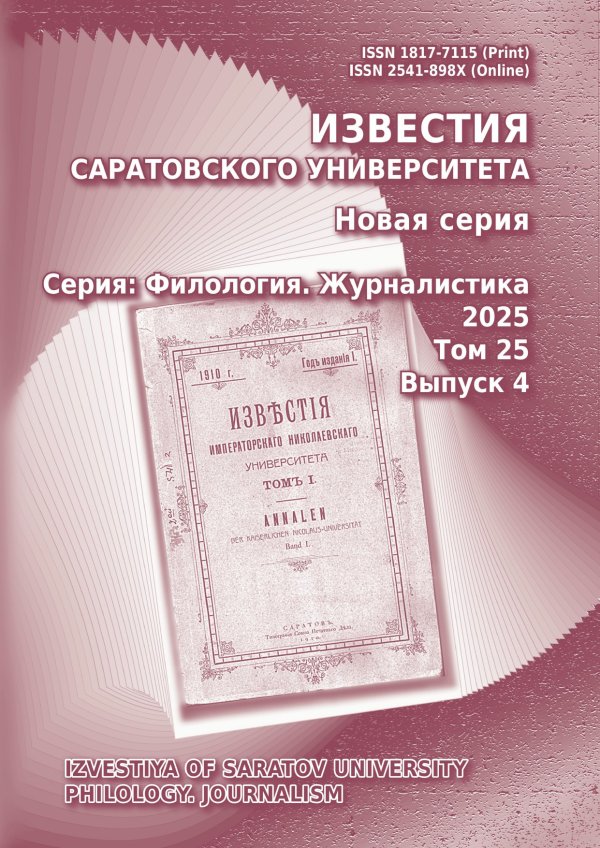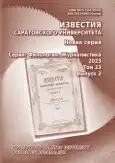Media prank: For nobody to trust anyone
- Authors: Vatletsov S.G.1,2
-
Affiliations:
- Nizhniy Novgorod State University
- National Research University “Higher School of Economics” (Nizhny Novgorod)
- Issue: Vol 23, No 2 (2023)
- Pages: 172-178
- Section: Articles
- URL: https://journal-vniispk.ru/1817-7115/article/view/251661
- DOI: https://doi.org/10.18500/1817-7115-2023-23-2-172-178
- EDN: https://elibrary.ru/HNNDAC
- ID: 251661
Cite item
Full Text
Abstract
Modern media demonstrate a distinctive feature when professional and official news agencies neighbor with amateur analytical Internet platforms. News outlets, social networks and video hosting services influence each other and create a mixed worldview. They also compete for their customer, for the likes that they would get and for the dislikes for their opponents. The subject of this paper is pranks and hoaxes in media, the description of practical jokes in the Russian political discourse from the journalistic, sociological, psychological, legal, linguistic viewpoints and locate them in the modern communication. In the course of the research the author comes to the conclusion that pranks and hoaxes in media should not be referred to as either a brand new journalism or a new type of interviewing. They are a means of provocation and social atomization. Practical jokes in media are political cloutlighting and belong to culture jamming activities. Pranksters do not provide information to society. Designed pranks and hoaxes might function as trial balloons for the third parties and as a way of influencing the audience in order to bias people against the prank victim. Humor in media pranks sidetracks people from debating about urgent issues and making the right decisions on them. As a result, practical jokes first undermine the credibility of one news outlet, and then destroy the whole system of communicating news. The habit of playing pranks on people in media inevitably leads to lowering the moral norms among those who execute pranks and those who consume them.
About the authors
Sergei G. Vatletsov
Nizhniy Novgorod State University; National Research University “Higher School of Economics” (Nizhny Novgorod)
ORCID iD: 0000-0002-4884-9199
603950 Nizhniy Novgorod, 23 Prospekt Gagarina (Gagarin Avenue)
References
- YouTube. Available at: https://www.youtube.com/watch?v=tVo_wkxH9dU (accessed May 31, 2022).
- Ministers warned after “prank” video call with Ben Wallace emerges – as UK blames Russia for hoaxes. Sky News, 2022, March12. Available at: https://news.sky.com/story/ministers-warned-after-prank-video-call-with-ben-wallace-emerges-as-uk-blames-russia-for-hoaxes-12572566 (accessed March 12, 2022).
- Sukhodolov A. P., Kudlik E. S., Antonova A. B. Prank Journalism as a New Genre in the Russian Media Landscape. Voprosy teorii i praktiki zhurnalistiki [Issues of Theory and Practice on Journalism], 2018, vol. 7, no. 3, pp. 361–370 (in Russian). https://doi.org/10.17150/2308-6203.2018.7(3).361-370
- Vdovichenko L. V. Fake news, prank as information challenges of the modern media environment. In: Odin poyas – odin put’. Lingvistika vzaimodeystviya [One belt – one way. Linguistics of interaction. Papers of International scientific conference]. Yekaterinburg, Ural State Pedagogical University Publ., 2017, pp. 38–40 (in Russian).
- Nizovkina E. N. Prank: definition of term, the history of the formation of prank-journalism. Trudy Instituta biznes-kommunikatsii [Works of The Institute for Business Communication], 2019, vol. 6, pp. 102–110 (in Russian). EDN: EQYRWR
- Dementieva K. V., Nizovkina E. N. Prank as a new phenomenon in modern Russian journalism. Kommunikativnye issledovaniya [Communication Studies], 2020, vol. 7, no. 1, pp. 101–122 (in Russian). https://doi.org/10.24147/2413-6182.2020.7(1).101-122
- Duskaeva L. R., Shcheglova E. A. Perception of comic text-prank in the dialogue of network communication: Creating a problem. Media Linguistics, 2020, vol. 7, iss. 2, pp. 238–249 (in Russian). https://doi/org/10.21638/spbu22.2020.207
- Chernova S. V. “Prank” as a Speech Genre or Entertainment Discourse in Its Culturological Context. Linguistics & Polyglot Studies, 2016, no. 8, pp. 189–200 (in Russian).
- Dery M. The Merry Pranksters and the Art of the Hoax. The New York Times. Available at: https://www.nytimes.com/1990/12/23/arts/the-merry-pranksters-and-the-art-of-the-hoax.html (accessed February 12, 2018).
- Bing J. M. Gotcha: What Social Activists Can Learn from Pranksters. Women and Language, 2013, vol. 36, iss. 2, pp. 97–105. Available at: https://digitalcommons.odu.edu/cgi/viewcontent.cgi?article=1006&context=english_fac_pubs (accessed May 7, 2020).
- Harold C. Pranking rhetoric: “Culture Jamming” as media activism. Critical Studies in Media Communication, 2004, vol. 21, iss. 3, pp. 189–211. https://doi.org/10.1080/0739318042000212693
- Karpińska-Krakowiak M., Modliński A. Prankvertising – Pranks as a New Form of Brand Advertising Online. Modern Management Review (MMR), 2014, vol. XIX, no. 21 (3/2014), pp. 31–44. https://doi.org/10.7862/rz.2014.mmr.31
- Lindsay J. Cloutlighting Is the Obnoxious and Abusive Social Media Trend That You’ve Probably Retweeted. Metro. Available at: https://metro.co.uk/2018/11/27/cloutlighting-is-the-obnoxious-and-abusive-social-media-trend-that-youve-probably-retweeted-8181469/ (accessed July 25, 2022).
- Jarrar Y., Awobamise A., Nnabuife S., Nweke G. E. Perception of Pranks on Social Media: Clout-Lighting. Online Journal of Communication and Media Technologies, 2020, vol. 10, iss. 1, e202001. https://doi.org/10.29333/ojcmt/6280
- McLeod K. Media Pranks: A Three-Act Essay. International Journal of Communication, 2011, vol. 5, pp. 1725–1736. Available at: https://www.researchgate.net/publication/298612272_Media_Pranks_A_Three-Act_Essay (accessed July 25, 2022).
- Elmirzoev R. E. The features of the genre: online video publications “pranks”. Mediaissledovaniya [Media Research], 2018, no. 5, pp. 196–200 (in Russian).
- Vatletsov S. G. A verbal aggression as an esthetics and ritual of identity. Russian Speech, 2020, no. 3, pp. 7–21 (in Russian). https://doi.org/10.31857/SO13161170004194-2
- Vatletsov S. G. On pranking and Prankers. Yuridicheskiy mir [Juridical World], 2018, no. 4 (256), pp. 46–49 (in Russian). EDN: UPMHOF
- Fairclough N. Critical Discourse Analysis: The Critical Study of Language. 2nd ed. New York, Routledge, 2010. 608 p.
- Good Ch. Prank Journalism at Its Best. The Atlantic. Available at: https://www.theatlantic.com/politics/archive/2011/03/prank-journalism-at-its-best/73002 (accessed June 25, 2022).
- In BFU Vovan and Lexus shared their secrets of their success in telephone talks. Wikinews, 2020, 9 September. Available at: https://ru.wikinews.org/wiki/%D0%92_%D0%91%D0%A4%D0%A3_%D0%BF%D1%80%D0%B0%D0%BD%D0%BA%D0%B5%D1%80%D1%8B_%D0%92%D0%BE%D0%B2%D0%B0%D0%BD_%D0%B8_%D0%9B%D0%B5%D0%BA%D1%81%D1%83%D1%81_%D0%BF%D0%BE%D0%B4%D0%B5%D0%BB%D0%B8%D0%BB%D0%B8%D1%81%D1%8C_%D1%81%D0%B5%D0%BA%D1%80%D0%B5%D1%82%D0%B0%D0%BC%D0%B8_%D1%83%D0%B4%D0%B0%D1%87%D0%BD%D1%8B%D1%85_%D1%82%D0%B5%D0%BB%D0%B5%D1%84%D0%BE%D0%BD%D0%BD%D1%8B%D1%85_%D1%80%D0%B0%D0%B7%D0%B3%D0%BE%D0%B2%D0%BE%D1%80%D0%BE%D0%B2 (accessed November 5, 2020).
- Vlasova E. Hooliganism or investigation? Students of the SevSU met the founders of the Russian prank-journalism. SevSU, 2018, 21 September. Available at: https://www.sevsu.ru/english/novosti/item/4527-khuliganstvo-ili-rassledovanie-studenty-sevgu-vstretilis-s-osnovatelyami-rossijskoj-prank-zhurnalistiki (accessed September 21, 2018) (in Russian).
- Ward S. J. A. Governor Walker and the Beast: Do Ends Justify the Means. School for Journalism and Ethics, 2011, March 12. Available at: https://ethics.journalism.wisc.edu/2011/03/12/governor-walker-and-the-beast-do-ends-justify-the-means (accessed May 25, 2018).
- Poryvayeva L. Prankers offered American minister “Poroshenko’s fuel” of manure. Ridius, 2017, 25 July. Available at: https://www.ridus.ru/news/257684 (accessed on July 25, 2017) (in Russian).
- Riedler B. Sila tvoego vybora [Understanding Yourself and Others]. Saint Petersburg, ID VES’, 2003. 224 p. (in Russian).
- Vatletsov S. G. Bilingualism and Doublespeak. In: Russian Sociology in the Period of Crisis, Critique and Change: The Papers of Russian Sociologists for the the 11th ESA Conference Crisis, Critique and Changes in Torino, Italy, August 28–31 2013, Moscow, RSS, 2013. 1 CD ROM, Moscow – Torino, 2013, pp. 496–497.
- Hoax. Merriam-Webster. Available at: https://www.merriam-webster.com/dictionary/hoax (accessed June 21, 2022).
- Judgment on Case of Prager and Oberschlick v. Austria, application № 15974/90. In: Dissenting opinion of judge Martens, joined by judges Pekkanen and Makarczyk. Strasbourg, European Court of Human Rights, 1995, 26 April. Available at: https://hudoc.echr.coe.int/eng#{%22fulltext%22:[%22Prager%20and%20Oberschlick%20v.%20Austria%20Application%20%E2%84%96%2015974/90%22],%22itemid%22:[%22001-57926%22]} (accessed May 22, 2019).
- Global Charter of Ethics for Journalists, adopted at the 30th IFJ Congress in Tunis on 12 June 2019, completing the IFJ Declaration of Principles on the Conduct of Journalists, 1954. Brussels, International Federation of Journalism, 1919. Available at: https://www.ifj.org/fileadmin/user_upload/Global_Charter_of_Ethics_EN.pdf (accessed June 5, 2022).
- Skaggs J. Interview by Joe Crisafi. Joey Skaggs.com, 2013. Available at: https://joeyskaggs.com/wp-content/uploads/2013/12/Crisafi-Skaggs-Interview-final.2011.pdf (accessed May 25, 2020).
- Burris C. T., Leitch, R. Harmful fun: Pranks and sadistic motivation. Motivation and Emotion, 2018, no. 42, pp. 90–102. https://doi.org/10.1007/s11031-017-9651-5
- Karpińska-Krakowiak M. Consumers, Play and Communitas – an Anthropological View on Building Consumer Involvement on a Mass Scale. Polish Sociological Review, 2014, vol. 187, iss. 3, pp. 317–331.
- Kroet C. Post-truth enters Oxford English Dictionary. Politico, 2017, June 27. Available at: https://www.politico.eu/article/post-truth-enters-oxford-english-dictionary/#:~:text=Post%2Dtruth%20is%20defined%20as,of%20Oxford’s%20U.S.%20Dictionaries%20division (accessed March 23, 2020).
- Lexus and Vovan confess that they deal with intelligence. Parlamentskaya gazeta, November 20, 2017. Available at: https://www.pnp.ru/social/leksus-i-vovan-priznalis-chto-oni-zanimayutsya-razvedkoy.html (accessed November 20, 2017) (in Russian).
- Department of State appreciated the Russian prankers’ sense of humor. RIA Novosti, October 6, 2017. Available at: https://ria.ru/20171006/1506340993.html (accessed October 6, 2017) (in Russian).
- Spears R. A. Dictionary of American Slang. Moscow, Russkiy yazyk, 1991. 528 p. (in Russian).
- Mason R. Video Released Showing Russian Hoax Call with UK Defence Secretary. The Guardian, March 21, 2022. Available at: https://www.theguardian.com/world/2022/mar/21/video-released-showing-russian-hoax-call-with-uk-defence-secretary (accessed March 21, 2022).
- Burnett S. Kremlin or Pranksters? New Audio reveals Juncker and Morgherini Talked Policy in Russian Prank Call. Euronews, July 28, 2018. Available at: https://www.euronews.com/2018/07/18audio-reveals-juncker-and-mogherini-talked-policy-prank (accessed July 28, 2018).
Supplementary files










